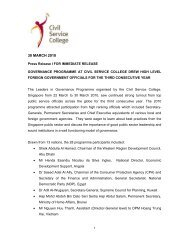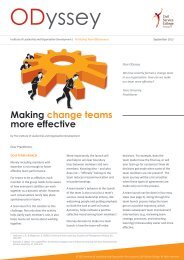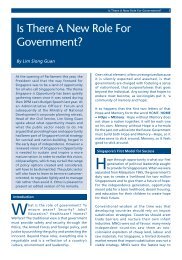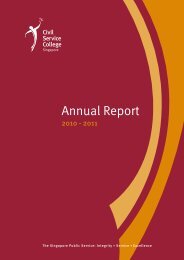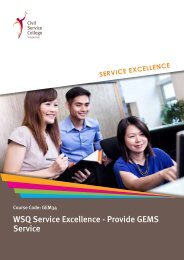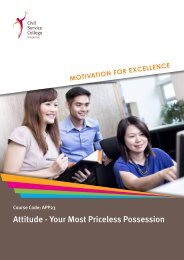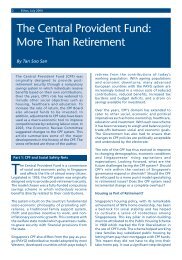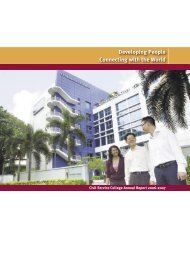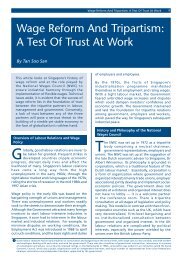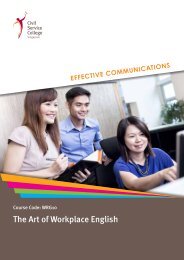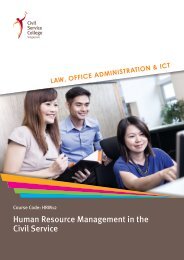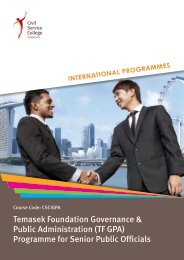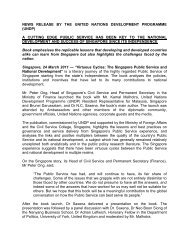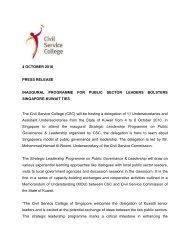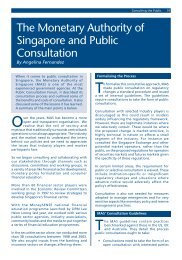Public Consultation Toolkit - Civil Service College
Public Consultation Toolkit - Civil Service College
Public Consultation Toolkit - Civil Service College
Create successful ePaper yourself
Turn your PDF publications into a flip-book with our unique Google optimized e-Paper software.
<strong>Public</strong> <strong>Consultation</strong> <strong>Toolkit</strong> 49 50 <strong>Public</strong> <strong>Consultation</strong> <strong>Toolkit</strong><br />
Case 13:<br />
Registration framework for public accountants<br />
Agency/country:<br />
• Accounting and Corporate Regulatory Authority (ACRA), Singapore<br />
Background:<br />
• ACRA launched a consultation exercise in July 2007 to seek views on whether the registration<br />
framework for public accountants was sufficiently relevant and robust.<br />
<strong>Consultation</strong> Process:<br />
• ACRA engaged the profession and the business community by publishing the consultation<br />
report 2007 and the final report 2008 at ACRA’s annual <strong>Public</strong> Accountants Conference (PAC).<br />
The PAC was well attended by public accountants and representatives from the business<br />
community, with an average attendance of 500-700 persons. The PAC was therefore an<br />
effective channel for the consultation exercise.<br />
• ACRA pro-actively consulted the various stakeholders through focus group discussions,<br />
“consultation clinics”, written submissions and print media. The focus group sessions were<br />
useful, particularly for a number of the audit firms whose “peak season” occurred during the<br />
ACRA consultation period. Feedback was received from a number of firms that would not<br />
otherwise have provided their feedback during the consultation, as they were not able to<br />
devote their staff to prepare the written feedback (in one example, it was felt that having 10<br />
partners (senior management in audit firms) spend 2 hours to provide feedback to the ACRA<br />
team was more cost effective to the firm, compared to a few man days writing and vetting<br />
the feedback.<br />
• The stakeholders included public accounting entities (the big four firms), professional bodies<br />
(e.g., ACCA, CPA Australia), academics and general public.<br />
• The public consultation exercise took place over two months.<br />
• Closing the loop via ACRA’s annual <strong>Public</strong> Accountants Conference.<br />
• In 2008, ACRA closed the loop via a presentation to round up its consultation exercises.<br />
Outcomes:<br />
• The final report of the consultation outcomes were also posted on the ACRA website at<br />
http://www.acra.gov.sg/News_and_Events/<strong>Public</strong>+Accountants+Conference+2008.htm<br />
• Quality feedback and validation of ACRA’s Statements of policy intent and regulatory<br />
strategy: Stakeholders provided valuable feedback which supported and validated many<br />
of ACRA’s observations and proposals. At the ACRA conference which was well attended by<br />
the majority of the public accounting firms registered with ACRA, the ACRA representative<br />
also addressed feedback which did not translate into eventual policy decisions, or where<br />
the original proposal put forth for consultation was modified after due consideration of<br />
feedback.<br />
• Timely action resulting in good reputation of ACRA as a responsive government agency: The<br />
participants were pleased to note that ACRA did a prompt follow-through on the issue of the<br />
then “talent crunch” faced by the accounting profession, by committing to a review of the list<br />
of recognised qualifications for registering public accountants.<br />
Learning points:<br />
• Given the segmented nature of the public accountancy profession, the consultation enabled<br />
ACRA to better understand the diverse concerns of different stakeholder groups. The strategy<br />
to extensively reach out and engage different stakeholder groups ensured comprehensive<br />
coverage of the profession’s interest.<br />
• ACRA closed the loop effectively with participants and stakeholders through:<br />
(a) A well-documented report of the consultation exercise. The consultation<br />
report is available on the ACRA website at: http://www.acra.gov.<br />
sg/NR/rdonlyres/4C5D29D8-A7BC-4216-B951-18D47EAF0789/9845/<br />
TheRegistrationFrameworkfor<strong>Public</strong>AccountantsPathto.pdf<br />
(b) Arranging for the final report (post consultation) to be presented to the consulted<br />
parties, at an annual ACRA conference. In so doing, the consulted parties received<br />
the benefit of a face-to-face presentation, as well as the opportunities to clarify any<br />
remaining questions which they had on the policies being consulted.<br />
(c) Posting the presentation slides (outlining the outcome of the consultation exercise) on<br />
ACRA’s website. In so doing, the information contained in the “closing the loop” phase of<br />
the consultation process is “preserved” for future reference. It also helped ACRA maintain<br />
its reputation for being a transparent and responsive regulator.



